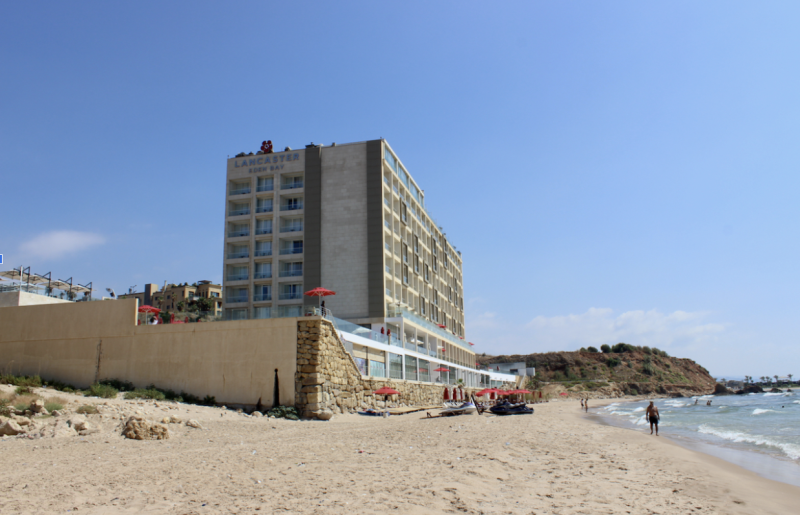
The Lancaster Eden Bay Hotel, built directly on Beirut's last remaining public beach in 2018, was seen by many as a symbol of the state's willingness to allow developers to privatize public shorelines. (Credit: Richard Salame/L'Orient Today)
BEIRUT — While the August heat continues to beat down on Lebanon, residents and tourists are flocking to the sea.
As has been the case for decades, much of the choicest coastline is off limits except to paying customers of each of the endless number of private beach resorts that have established themselves — illegally according to public space activists — along the shore. But amid Lebanon’s crisis, have these privatized beaches become more or less affordable?
L’Orient Today collected the current entry prices of 48 beach resorts and found they ranged from LL50,000 (about $1.50 at the parallel market rate) to upwards of LL1.1 million ($35). The average price for a weekend adult entry at the surveyed resorts was about LL340,000 ($10), with a median price of LL300,000 ($9). Many resorts offered discounts for children and slightly lower prices either Monday through Thursday or Monday through Friday.
A couple resorts said they were in the midst of raising their prices. In 2015, the magazine Executive reported that the average entry fee for a beach club was LL40,000 ($27). In 2019, the magazine estimated the average cost at LL45,000 ($30). Since then, in lira terms, prices have skyrocketed while remaining below their pre-crisis dollar equivalents. Unlike visitors, many if not most Lebanese households do not have access to dollars, however.
With a majority of Lebanon’s population estimated to be in poverty, and a spiraling crisis in the cost of living, even relatively less expensive beach resorts are likely to remain out of reach for most Lebanese.
At least 80 percent of Lebanon’s shoreline is privatized, according to a study by the Institute of the Environment at the University of Balamand, so there are not always many free or accessible choices.
For most Beirutis unable to pay the cost of entrance to a private beach club, for instance, the choice is between the relatively polluted Ramlet al-Baida or to venture to the north or south of the country to go to cleaner public beaches such as those of Sour or Jbeil.
However, free public beaches in Lebanon typically suffer from a lack of investment in cleaning and maintenance, which can discourage potential visitors.
Pierre Achkar, the head of the Federation of Tourism Syndicates, defended the business practices of Lebanon’s resorts. There are low-cost beach options in addition to high-cost luxury resorts, he pointed out.
“Today, people always take the most expensive restaurant and tell you it’s too expensive, and people love to go to the most expensive restaurant,” he told L’Orient Today.
“If you go to the establishments that are taking LL300,000 and above you see that, truly, there is a level of investment that is much greater than the average. Everything has its price,” he said. More expensive beach resorts tend to have high maintenance costs in order to provide the services they do, justifying the price, according to him.
As for the cost of living crisis in Lebanon, no one is living as they did before the crisis, Achkar said, including himself.
For Mohammad Ayoub, director of Nahnoo, a research and advocacy organization that advocates for preserving public spaces, the price these businesses charge is almost beside the point since they are, he says, illegal under a 1925 law that establishes “the seashore extending to the farthest point that waves reach during winter, as well as sand and gravel beaches” as public property.
“First, your existence is illegal, so you don’t have the right to exist,” he said. “This means you can’t close [access to] it and you can’t get money from the beach.”
The 1925 law has over time been “disfigured” in the words of Nahnoo member and architect Cynthia Bou Aoun, although the beach clubs are still in violation, says Ayoub.
But for Ayoub, the issue goes beyond coastal access alone. He said Lebanon’s government is an outlier in allowing private developers to build right up to, in some cases directly on, the beach.
Well-maintained, clean public beaches are a draw for tourism, he said, and enrich municipal governments and local economies. They also support local communities and preserve cultural and ecological heritage. Private resorts, on the other hand, take resources out of the commons and turn public wealth into private profit for a handful of owners.
“In any country in the world you don’t find resorts on the beach,” he said. “There is a road between the resorts and the beach.”